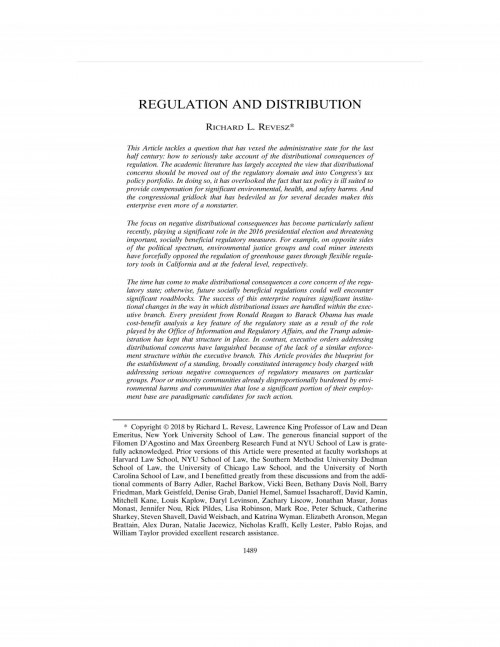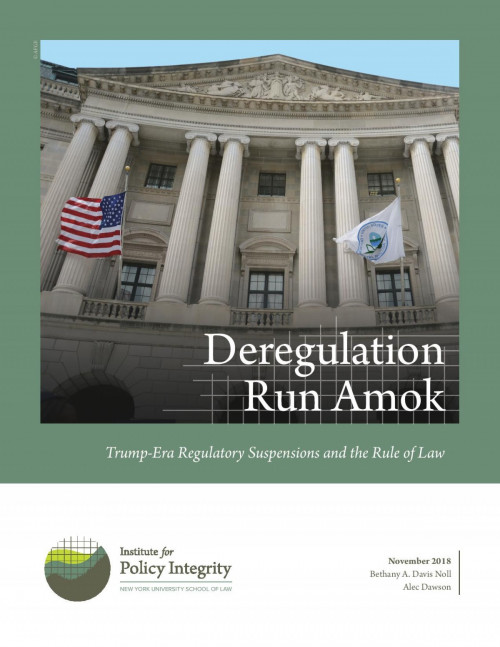-
Comments on Proposed Regulation to Require Drug Price Disclosures
The Centers for Medicare and Medicaid Services (CMS) recently proposed a rule that would require pharmaceutical companies to disclose the list prices of prescription drugs in television ads. We submitted comments pointing out flaws in the agency’s analysis of the proposal’s likely costs and benefits.
-

Regulation and Distribution
This article, published in the New York University Law Review, tackles a question that has vexed the administrative state for the last half century: how to seriously take account of the distributional consequences of regulation. Academic literature has largely accepted the view that distributional concerns should be moved out of the regulatory domain and into Congress’s tax policy portfolio. In doing so, it has overlooked the fact that tax policy is ill suited to provide compensation for significant environmental, health, and safety harms. And the congressional gridlock that has bedeviled us for several decades makes this enterprise even more of a nonstarter. The time has come to make distributional consequences a core concern of the regulatory state – otherwise, future socially beneficial regulations could well encounter significant roadblocks. This article provides the blueprint for the establishment of a standing, broadly constituted interagency body charged with addressing serious negative consequences of regulatory measures on particular groups.
-
Comments on Homeland Security’s “Public Charge” Rule Affecting Applicants for Permanent Residency
The Department of Homeland Security (DHS) recently proposed a rule that would substantially expand DHS’s ability to deny applications for lawful permanent residency by deeming immigrants likely to become “public charges.” We submitted comments critiquing the cost-benefit analysis accompanying DHS’s proposal.
-
Roundup of Trump-Era Deregulation in the Courts
The Trump administration has undertaken numerous deregulatory actions through rule suspensions; repeals; rescissions; efforts to weaken regulations through guidance, memoranda, amendments, or replacements; and more. Many of these actions have been challenged in court and decisions have been reached in several cases.
The Institute for Policy Integrity maintains a publicly available list of the outcomes of those lawsuits. This “Roundup,” which we update regularly, has been cited by the New York Times, the Wall Street Journal, the Washington Post, Bloomberg, E&E News, and the Brookings Institution.
The Roundup provides an overview of each court decision, with relevant links to the government actions and court rulings. It also tallies the successful and unsuccessful outcomes for the administration for ease of reference. Updates should be submitted to [email protected].
-
Comments to FERC on Rio Grande Natural Gas Project
The Federal Energy Regulatory Commission (FERC) prepared a Draft Environmental Impact Statement (DEIS) for the Rio Grande LNG Project. Despite quantifying over 8 million metric tons of carbon dioxide-equivalent emissions per year from operations, FERC does not account for the climate effects of these emissions. We submitted joint comments that offer a detailed rejection of FERC’s arbitrary and misleading rationale for failing to monetize the project’s climate effects. We urge the agency to apply social cost of greenhouse gases estimates.
-
Comments on Environmental Impact Statement for Changes to Grand Staircase-Escalante Monument
The Bureau of Land Management (BLM) recently released an Environmental Impact Statement (EIS) for the Grand Staircase-Escalante Monument and Kanab-Escalante Planning Area. We submitted comments explaining why the agency should analyze the impacts of each land management alternative using Social Cost of Greenhouse Gases estimates.
-
Comments on EPA Rollback of Refrigerant Substitutes Regulation
EPA recently proposed rolling back regulatory provisions that curb emissions of refrigerant substitutes, which are highly potent greenhouse gases. The agency admits that the rescissions would significantly increase the release of refrigerator hydrofluorocarbons (HFCs) but fails to monetize the climate damages caused by forgone emissions reductions. We submitted comments explaining how EPA should value the climate damages of these greenhouse gases.
-
Comments on Environmental Impact Statement for Changes to Bears Ears Monument
The Bureau of Land Management and U.S. Forest Service recently released a Draft Environmental Impact Statement (EIS) on their land management proposal for the Bears Ears National Monument. The EIS does not consider the environmental impacts of shrinking the monument’s boundaries. We submitted comments explaining why the agencies are responsible for providing detailed environmental analysis of their proposal to alter the Bears Ears planning area.
-

Deregulation Run Amok
Trump-Era Regulatory Suspensions and the Rule of Law
Our report provides a survey of the legality of Trump Administration’s regulatory suspensions. Looking at a number of cases, we discuss the administration’s disregard for notice-and-comment requirements, statutory restrictions, and the reasoned explanation requirement. We also lay out some of the challenges facing advocates, and the strategies by which agencies have evaded review.
-
Comments on the Family Detention Rule
A recently proposed rule would allow the Department of Homeland Security to indefinitely detain immigrant children who enter the U.S. in the company of a parent or guardian. Under current law, such children must be released or transferred to a non-secure, state-licensed facility within 20 days. We filed comments critiquing the Department’s assessment of the costs and benefits of this policy change.
